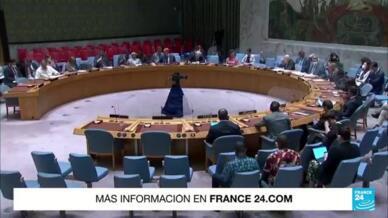First modification:
The UN Human Rights Office also reported that 234 people have been recent victims of gang violence in the country’s capital. Some have died and others are wounded, the vast majority of them without any kind of relationship in the conflict between the G-9 and G-PEP groups.
The information was presented through a statement published by the office’s spokesman, Jeremy Laucence, where he pointed out that so far in 2022, 934 people have lost their lives and that, in addition, in recent days they have received a large amount of complaints of sexual violence.
“We are deeply concerned about the worsening of the situation of violence in Port-au-Prince and the increase in abuses,” said Laurence, who also urged the Haitian authorities to “ensure that human rights are protected and prioritized when responding to the crisis”.
Given the difficult humanitarian reality experienced by the inhabitants of the Cité-Soleil neighborhood of the capital, where a large part of the population is without food or water because they are surrounded by the conflict, the spokesman called on the sectors involved to “respect the life of all Haitians, many of them living in extreme poverty.
In addition, the UN office warned that they predict that the conflict between gangs, far from being resolved in the coming days, will worsen, as they assure that the attacks are increasingly organized “including simultaneous and coordinated actions in various areas of the city.”
The UN calls to stop the supply of weapons
In the report prior to this July 16, the UN called for preventing the supply of weapons to criminal gangs in Haiti, and also unanimously approved extending the work of the United Nations Integrated Office in Haiti (BINUG) for one year. with the aim of offering support to the institutions after the withdrawal of the peacekeepers.
The UN “calls on member states to prohibit the supply of small arms, light weapons and ammunition to non-state actors that participate in or support gang violence, criminal activities or human rights abuses.”
The text also calls for the UN Secretary General, Antonio Guterres, to talk with the Haitian government, so that with the support of other countries, strategies can be found that provide solutions to the war between gangs and the humanitarian crisis.

They denounce state complicity
However, organizations such as the National Network for the Defense of Human Rights (RNDDH) have denounced that the Government is part of the conflict and that it encourages the Haitian National Police to stay out of the clashes, using silence as a response to the situation. of violence.
In addition, they assure that the destruction of houses with heavy machinery, the fires and the attacks, are supported by the Presidency of the country headed by Ariel Henry who assumed power after the assassination of Jovenel Moise in the month of July 2021.
The network has declared that the Executive uses the armed gangs to maintain a climate of “terror” in the territory and that for this they supply them with the necessary supplies to carry out the attacks in the neighborhoods, giving as an example that through the state institution The National Equipment Center was provided to the armed groups “G-9 and Fanmi and Alye heavy machinery to destroy houses and build passageways” within the neighborhood.

Crises and more crises
In April 2022, the security crisis has worsened after two of the country’s main armed gangs began a war for control of different neighborhoods located north of the nation’s capital.
The neighborhood of Nan Brooklyn, belonging to Cité Soleil in Port-au-Prince, has been the most affected because the coalition of the G-9 and Fanmi and Alye gangs have set themselves the goal of evicting the head of the armed group G-PEP, Gabriel Jean Pierre.
Street criminal groups have taken over many of the capital’s roads, preventing access to humanitarian aid destined for more than 3.8 million people in the south of the territory.

The road closure has also prevented the trucks in charge of distributing fuel at the service stations from approaching the ports where the ships unload the supplies, thus deepening the already difficult shortage that Haiti has been experiencing for more than three years, generating citizen protests in the streets and an increase in informal businesses that sell more than double the gallon.
Currently, the nation is going through an economic and food security crisis where almost half of the population, some 4.5 million people, is going hungry, so many choose to leave their homes and seek asylum abroad.
With EFE and Reuters



![[Img #74675]](https://thelatestnews.world/wp-content/uploads/2024/12/They-discover-a-new-class-of-X-ray-sources-in-the-150x150.jpg)











Add Comment